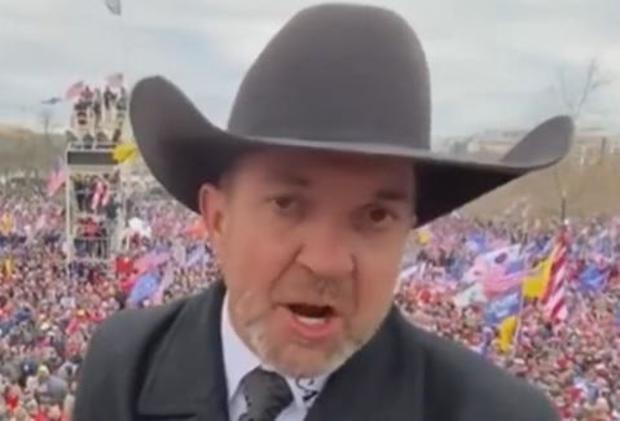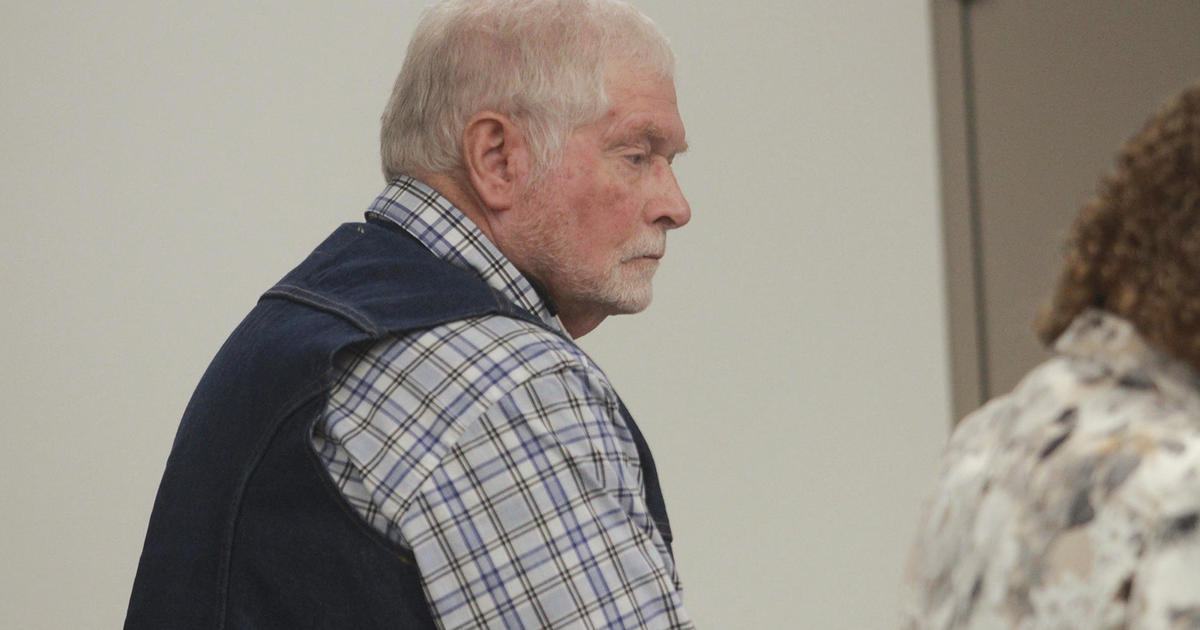Some Jan. 6 defendants turn to trial by judge instead of jury
Many of the U.S. Capitol riot defendants who traveled across the country to get to Washington, D.C., on Jan. 6, 2021 are now angling to get their cases away from jurors in Washington, D.C.
A review of tens of thousands of pages of court filing by CBS News shows more than a dozen Jan. 6 defendants have unsuccessfully tried to move their trials out of the nation's capital, arguing the jury pool in Washington is potentially tainted by bias, stemming either from its residents' liberal political leanings or the impact of the riots on the District. These defendants have asked for a change of venue but have so far failed to convince D.C. judges that a transfer is necessary.
But there is another route for these defendants — they may ask for a bench trial, in which defendants argue their cases before a judge, rather than a jury. In two cases so far, Capitol breach defendants chose bench trials, putting their fate into the hands of one judge, instead of 12 strangers.
The same judge handled the two bench trials and acquitted the two defendants on five of the six total federal charges at issue, marking the only trial acquittals so far in the handful of U.S. Capitol riot prosecutions to go to trial.
Change of venue motions
In most cases, defendants would like to move their trials back to their hometowns or communities, arguing the odds of a fair trial are greater. A Harrisburg woman who was linked to the theft of a computer from the offices of House Speaker Nancy Pelosi, an Oath Keeper alleged to have committed seditious conspiracy, an accused Proud Boy from Florida and a California man who allegedly used a megaphone to taunt police are among those asking to take their cases out of Washington, D.C.
Though none of the change-of-venue requests have been approved by judges yet, they've taken on added import in the last month, after a D.C. jury convicted Jan. 6 defendant Guy Reffitt of multiple felonies in less than four hours of deliberations.
In a new filing, accused Florida Proud Boy Gabriel Garcia argues "An extreme level of prejudice exists in D.C. for January 6 Proud Boys defendants, like him." Garcia's motion also claims jurors in the District of Columbia are "friendly" to prosecutors.
"Regrettably, in such a historic prosecution, any conviction of a Proud Boy or Oath Keeper by a D.C. jury will forever be tainted, questioned, and held to ridicule as vigilante-like justice, reeking of political comeuppance," his motion said.
Garcia has pleaded not guilty to civil disorder and other federal charges.
In a filing earlier this month, defendant Sean McHugh, who's accused of shouting at police through a megaphone and aiming chemical spray at police, also sought a transfer of his case out of Washington, D.C. McHugh claimed in a filing, "A huge proportion of District of Columbia residents either work for the federal government themselves or have friends or family who do." He added, "Even District residents that have no direct connection to the government reported feeling deeply traumatized by the events that took place so close to where they live and work."
Garcia recently commissioned a survey from jury consultant John Zogby to develop as part of his legal strategy. It found that almost 3 out of 4 among 400 D.C. residents said they "believe that any individual who was inside the Capitol on January 6, 2021 should be convicted of insurrection."
McHugh's change of venue request alleges Washington, D.C. residents overwhelmingly "[v]oted for President Biden." According to the government's theory of the case, McHugh and the others charged in connection with Jan. 6 took the action they did in order to prevent Joe Biden from becoming president, even though he had won the greater share of the electoral votes. Because the government's theory is that McHugh and others were seeking to nullify the votes of an overwhelming majority of District residents in the only national election in which District residents have any say, in McHugh's eyes, they cannot fairly judge his case.
McHugh has pleaded not guilty.
"The effort of so many of the Jan. 6 defendants to move their trials out of D.C. based on allegations of bias within the D.C. jury pool is the legal equivalent of a "fool's errand,'" said University of Maryland law professor Michael Greenberger. "The effort is self evidently not to avoid juror bias. Federal jurors nationwide saw and felt the grievous impact of the attack on the Capitol and the devastation wrought."
A judge has rejected a change of venue request made by accused Oath Keeper conspirator Thomas Caldwell. Caldwell, who has pleaded not guilty, argued that D.C. jurors are exposed to biased media coverage. His motion said, "Jurors outside of the D.C. media market will have far less exposure to the non-stop biased and prejudicial press coverage."
U.S. District Judge Amit Mehta, an Obama appointee, ruled that Caldwell "has utterly failed to present any evidence of actual bias in the jury pool. His assertions that media coverage "ha[s] prejudiced the potential District jury pool" are based entirely on his own speculation."
Prosecutors have asked judges to reject the change-of-venue motions reviewed by CBS News, arguing that media coverage and attention to the Jan. 6 riot isn't limited to the District, but extends across the country.
Greenberger thinks the change of venue requests are long-shot, desperate efforts.
"It is an obvious, impermissible attempt to evade the strength and organization of D.C. federal prosecutors in the futile hope of facing less focused and prepared prosecution elsewhere," he said. "The burden to obtain a change of venue is far too high for such a questionable strategic tactic to have any chance of success."
Trial by judge — not by jury
Of the nearly 775 defendants in the Capitol riot, more than 500 could face trial. After interruptions to court operations by the COVID-19 pandemic, the U.S. District Court for the District of Columbia has resumed scheduling trials, including in the highest level Jan. 6 conspiracy cases.
In the first jury trial in a Jan. 6 case, 12 empaneled men and women spent under four hours deliberating before convicting Reffitt, of Wylie, Texas. His case was distinctive in that he was convicted of carrying a gun while in the mob, his own son testified against him and he failed to offer any defense witnesses or testimony.
One of the 12 jurors — who asked CBS News not to identify her by name — said the case was simple for the jury. She said it noted the lack of a defense presentation, and that was relevant in the jury's decision to convict Reffitt. "The one time we saw any emotion out of him was when his son took the stand," she said.
In the weeks after the Reffitt verdict, two other Capitol breach defendants formally opted for bench trials before a judge, rather than a jury of Washington, D.C. residents. Both cases were heard by D.C. District Judge Trevor McFadden, a Trump appointee.
McFadden acquitted the two men on five of the six charges filed.
In March, the judge found Couy Griffin, a county commissioner from New Mexico, guilty of entering a restricted building on Jan. 6, 2021, but not guilty of disorderly conduct.
Griffin told supporters in the courtroom that he had won a partial victory when the trial concluded. Asked by CBS News if he recommended other defendants seek bench trials, Griffin said he wasn't sure. "That's putting your eggs in one basket, instead of 12," he replied.
Last week, McFadden found Matthew Martin, a government contractor from New Mexico, not guilty on all four misdemeanor charges brought against him. In his ruling, the judge found Martin had not made noise, had not crowded others and had not damaged anything while inside the Capitol. McFadden said Martin had also possibly interpreted the movement of some police officers as an indication the crowd was allowed inside. Nonetheless, Martin's defense attorney, Dan Cron, told CBS News every defendant should weigh the risks and benefits of eschewing a jury in favor of a bench trial.
"That can cut both ways," he said. "If it's a jury trial, then all 12 have to convict somebody, whereas a bench trial has just one person. It can cut either way."
The Justice Department probe into the Jan. 6 attack on the Capitol continues this week, following CBS News' confirmation that the scope of the investigation is broadening to include Trump rally organizers and those who may have provided funding for Jan. 6. Nearly 780 defendants have been charged so far, with over 250 guilty pleas entered and 140 sentences imposed.
On Monday, a jury will continue to deliberate the fate of former Rocky Mount, Virginia, police officer Thomas Robertson, charged with multiple felony counts including obstructing Congress' certification of the electoral college votes. A separate jury is set to be empaneled on Monday in the case of Dustin Thompson, an Ohio man also charged with multiple felony counts include theft of government property.





